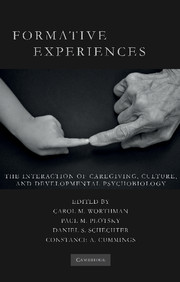Book contents
- Frontmatter
- Contents
- List of Figures
- List of Tables
- List of Contributors
- Foreword by Robert Sapolsky
- Preface
- List of Abbreviations
- Introduction
- SECTION ONE HISTORICAL, CROSS-CULTURAL, AND DEVELOPMENTAL SCIENCE PERSPECTIVES
- SECTION TWO HOW EXPERIENCE INTERACTS WITH BIOLOGICAL DEVELOPMENT
- SECTION THREE FORMATIVE RELATIONSHIPS WITHIN AND ACROSS GENERATIONS
- 7 Ethnographic Case Study: Bofi Foragers and Farmers – Case Studies on the Determinants of Parenting Behavior and Early Childhood Experiences
- Commentary
- Commentary
- 8 Clinical Case Study: Good Expectations – A Case Study of Perinatal Child-Parent Psychotherapy to Prevent the Intergenerational Transmission of Trauma
- Commentary
- Commentary
- 9 Ethological Case Study: Infant Abuse in Rhesus Macaques
- Commentary
- Commentary
- 10 Clinical Case Study: Multigenerational Ataques De Nervios in a Dominican American Family – A Form of Intergenerational Transmission of Violent Trauma?
- Commentary
- Commentary
- SECTION FOUR SOCIAL AND CULTURAL CONTEXTS OF CHILDHOOD DEVELOPMENT – NORMATIVE SETTINGS, PRACTICES, AND CONSEQUENCES
- SECTION FIVE FEAR, FUN, AND THE BOUNDARIES OF SOCIAL EXPERIENCE
- SECTION SIX PUBLIC HEALTH, EDUCATION, AND POLICY IMPLICATIONS
- Index
- References
10 - Clinical Case Study: Multigenerational Ataques De Nervios in a Dominican American Family – A Form of Intergenerational Transmission of Violent Trauma?
Published online by Cambridge University Press: 26 May 2010
- Frontmatter
- Contents
- List of Figures
- List of Tables
- List of Contributors
- Foreword by Robert Sapolsky
- Preface
- List of Abbreviations
- Introduction
- SECTION ONE HISTORICAL, CROSS-CULTURAL, AND DEVELOPMENTAL SCIENCE PERSPECTIVES
- SECTION TWO HOW EXPERIENCE INTERACTS WITH BIOLOGICAL DEVELOPMENT
- SECTION THREE FORMATIVE RELATIONSHIPS WITHIN AND ACROSS GENERATIONS
- 7 Ethnographic Case Study: Bofi Foragers and Farmers – Case Studies on the Determinants of Parenting Behavior and Early Childhood Experiences
- Commentary
- Commentary
- 8 Clinical Case Study: Good Expectations – A Case Study of Perinatal Child-Parent Psychotherapy to Prevent the Intergenerational Transmission of Trauma
- Commentary
- Commentary
- 9 Ethological Case Study: Infant Abuse in Rhesus Macaques
- Commentary
- Commentary
- 10 Clinical Case Study: Multigenerational Ataques De Nervios in a Dominican American Family – A Form of Intergenerational Transmission of Violent Trauma?
- Commentary
- Commentary
- SECTION FOUR SOCIAL AND CULTURAL CONTEXTS OF CHILDHOOD DEVELOPMENT – NORMATIVE SETTINGS, PRACTICES, AND CONSEQUENCES
- SECTION FIVE FEAR, FUN, AND THE BOUNDARIES OF SOCIAL EXPERIENCE
- SECTION SIX PUBLIC HEALTH, EDUCATION, AND POLICY IMPLICATIONS
- Index
- References
Summary
This case study describes a mother and daughter who participated in a clinical research study of the psychological and communicative processes involved in the intergenerational transmission of violent trauma. The research study is described in greater detail in previous publications (Schechter, Kaminer, Grienenberger, & Amat, 2003; Schechter, 2003). The version of the case presented in this chapter provides additional follow-up through the child's seventh year of life, some of which has been described in previous papers (Schechter et al., 2007; Hatzor, 2005).
Posttraumatic stress disorder (PTSD) and commonly comorbid psychopathology associated with the intergenerational transmission of violent trauma (i.e. dissociative, somatoform, affective, personality, and substance use disorders) are serious public health problems. We know from epidemiologic research that at least one-third of abused children will abuse their children when they become parents themselves. A similar number of male children who witness partner violence will become violent with their partners beginning in adolescence and continuing through adulthood. Abused, violence-exposed, and neglected children show an astonishingly high rate of PTSD and associated comorbid psychopathology – in particular, dissociative phenomena – that have been linked to intergenerational transmission (Oliver, 1993; Widom, 1999; Egeland & Susman-Stillman, 1996).
However, the specific psychological mechanisms by which perpetuation of violence (i.e., hostile stance), repeated victimization (i.e., helpless stance), and psychopathology associated with both (e.g., PTSD, dissociative phenomena) are transmitted remain largely unknown: hence our research study.
- Type
- Chapter
- Information
- Formative ExperiencesThe Interaction of Caregiving, Culture, and Developmental Psychobiology, pp. 256 - 269Publisher: Cambridge University PressPrint publication year: 2010
References
- 1
- Cited by

